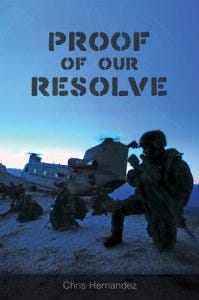Review: Proof of Our Resolve
I became aware of Chris Hernandez last week through an excellent article on the dumbing-down of the word trauma. You can find links and my commentary here. As is my usual procedure, while I was looking at his blog and bio, I discovered that he has written a few books. Now, I see this a lot. I don't usually just buy and review a book from an unknown. I'm well aware that although I am an extreme bookivore (I'll read darn near anything with text) there are painfully bad books out there. So I went to Amazon, critiqued the cover (I can't help it! Anyway, like the art, author's name is too small, typography needs help) and read the reviews and sample. This one had promise.

Don't come to Proof of our Resolve expecting a novel. It reads like a military memoir, and given Hernandez' background, I expect that in some ways it is. This is a fiction book, and it hasn't got a plot. Well, not really. It is a linear narrative of the events in a National Guard Sergeant's life during and immediately after a deployment to Afghanistan. It's not written first person, but we see into Nunez' thoughts and motivations as he shepherds his platoon through battles, injuries and even death.
The language is salty, and the violence feels real. I haven't read many memoirs of Afghanistan, I used to read tons of WWII and 'Nam era material, and this feels right. Boredom, punctuated by terror, and a coating of dust over it all. Our sergeant's internal dialogue is full of doubt, in himself, in the way the war is being run, and in the end, although he has regained a sense of why he and his men are fighting, that regretful flavor remains. During a final interview with his major, Nunez can barely restrain himself from protesting the onerous ROE they fight under, for instance.
If you are looking for a traditional novel, this probably won't suit you. If you are looking for a peek inside a modern fighting unit, then by all means, try out Proof of our Resolve. I'm not at all sorry I picked it up, it is solidly written, not brilliantly, and was worth the time in reading it. There is a second in a proposed series, and I will take a look at it, too, looks like it is the continuation of what happens in civilian life after combat. As a writer, these books serve as a sort of research into a military mind. As a person, they are a reminder of what many of my friends have been through, and reasons I treasure those men and women highly. They were just doing their jobs, sure, but to those of us who remain safe, they are heroes.



